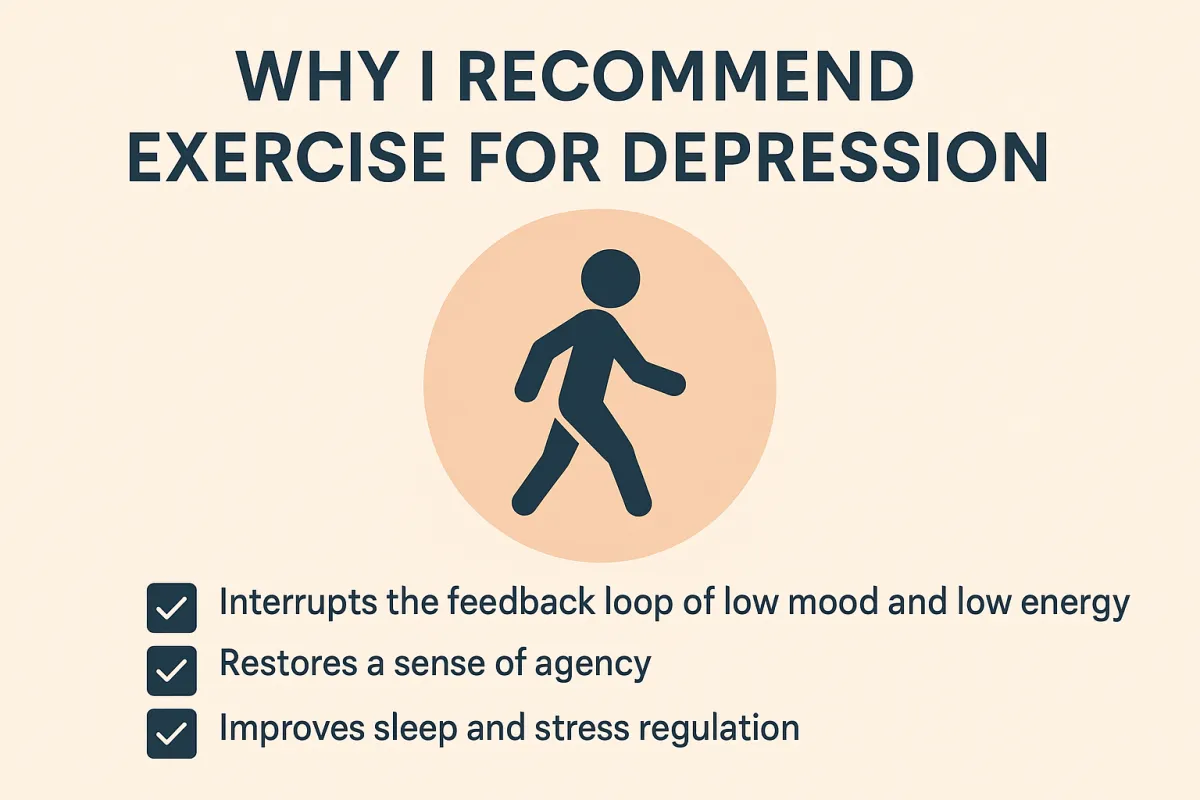
Exercise and Depression
Why I Recommend Exercise for Depression (And It’s Not Just About Fitness)
When someone is struggling with depression, suggesting exercise can feel like an oversimplification especially if you’ve been on the receiving end of that advice. “Go for a walk, you’ll feel better,” can sound dismissive when just getting out of bed is a challenge.
But here’s why I often do recommend exercise not as a magical fix, but as one powerful part of a broader support strategy for depression.
The Evidence Is Clear But Often Ignored
Exercise is one of the most well-researched non-pharmacological treatments for depression. Multiple studies and meta-analyses have shown that regular physical activity—especially aerobic forms like walking, cycling, or swimming can reduce symptoms of depression, often as effectively as medication for mild to moderate cases.
Importantly, it doesn’t need to be high intensity. Movement that raises your heart rate a little, done consistently, can alter brain chemistry in meaningful ways: increasing serotonin, endorphins, and brain-derived neurotrophic factor (BDNF), a kind of “fertiliser” for your brain cells.
Yet, despite this evidence, exercise is still under-prescribed in clinical practice.
It's Not About Weight Loss or "Fitness Goals"
When I recommend exercise for someone experiencing depression, it’s not about hitting the gym or changing how your body looks. It’s about changing how your body feels and reconnecting with your environment in small, manageable ways.
Think of it as a shift from mental stuckness to physical movement from isolation to engagement with your surroundings.
Even a 10-minute walk outdoors has been shown to shift mood, especially when done in green spaces. You don’t have to “feel motivated” first; often, the motivation follows the movement.
Why It Helps: A Few Key Reasons
Interrupts the feedback loop of low mood and low energy
Depression often creates a cycle where low mood leads to inactivity, which deepens the sense of helplessness. Gentle physical activity helps disrupt this loop.Restores a sense of agency
Depression can shrink your sense of self and control. Making the decision to move even a little can rebuild a sense of capability and autonomy.Improves sleep and stress regulation
Exercise helps regulate your sleep-wake cycle and reduces levels of stress hormones like cortisol. Both are vital in recovery.Supports connection
Group walks, casual sport, or even shared goals with a friend can reconnect us socially an antidote to the isolation that depression often brings.
But What If I Can’t Even Get Started?
That’s valid and common. When you're in the depths of depression, structured activity can feel like climbing Everest. That’s where the “activation” part of behavioural activation comes in: starting with small, doable actions that align with your values.
Maybe it’s standing outside barefoot for two minutes. Or stretching your arms overhead while making coffee. Maybe it’s walking to the end of your driveway. The point is not intensity it’s consistency and gentle reconnection.
We don’t need to wait for motivation. We can start with compassion and a commitment to ourselves.
Final Thought
I don’t recommend exercise as a substitute for therapy or medication. But I do suggest it because it gives people a way to begin. When everything feels foggy, uncertain, or stuck, movement can offer a path forward one small step at a time.
If you're currently navigating depression and don’t know where to start, you're not alone. And you don’t have to figure it out alone either.
